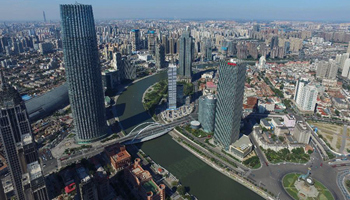UNITED NATIONS, Sept. 29 (Xinhua) -- UN Secretary-General Ban Ki-moon said on Thursday that "maritime transport is the backbone of global trade and the global economy," and "low-cost and efficient maritime transport has an essential role to play in growth and sustainable development."
Ban made the statement in his message to World Maritime Day, which is observed annually on Sept. 29. The World Day's theme this year is "Shipping: indispensable to the world."
"The importance of shipping in supporting and sustaining today's global society makes it indispensable to the world, and to meeting the challenge of the 2030 Agenda for Sustainable Development," he said, referring to the Agenda which was approved by world leaders in September last year to serve as the blueprint for the global development efforts for the next 15 years.
"Everybody in the world benefits from shipping, yet few people realise it. We ship food, technology, medicines, and memories," Ban said. "As the world's population continues to grow, particularly in developing countries, low-cost and efficient maritime transport has an essential role to play in growth and sustainable development."
Shipping helps ensure that the benefits of trade and commerce are more evenly spread, he said. "No country is entirely self-sufficient, and every country relies on maritime trade to sell what it has and buy what it needs. Much of what we use and consume in our everyday lives either has been or will be transported by sea, in the form of raw materials, components or finished articles."
"The jobs and livelihoods of billions of people in the developing world, and standards of living in the industrialized and developed world, depend on ships and shipping," he noted. "The shipping industry has played an important part in the dramatic improvements in global living standards that have taken millions of people out of acute poverty in recent years."
"It will be just as critical for the achievement of the 2030 Agenda for Sustainable Development, the plan agreed by all global leaders last year for people, peace, planet prosperity and partnership," he said. "Yet the vast majority of people are unaware of the key role played by the shipping industry, which is largely hidden from view."
On the theme this year, the secretary-general said, "The theme focuses on the critical link between shipping and the everyday lives of people all over the planet. The International Maritime Organization plays a vital role as the international regulatory body for an industry that spans the globe."
In a separate message to mark the Day, the secretary-general of the International Maritime Organization (IOM), Kitack Lim, highlighted that shipping has a major role to play in translating the momentum generated by the 2030 Agenda and the Paris Agreement on climate change into tangible improvements in the lives of people.
"In today's economy, people all over the world rely on ships to transport the commodities, fuel, foodstuffs, goods and products on which they depend. Maritime transport is the backbone of international trade and global markets," he said.
"Ships have never been so technically advanced, so sophisticated, never carried so much cargo, never been safer and never been so environment-friendly as they are today," Lim said. "It is thanks to this global fleet and global workforce of over one million seafarers that the import and export of goods on the scale necessary to sustain the modern world can take place."
"But, if the benefits of globalization are to be evenly spread, all countries must be able to play a full and active part in shipping," he added.
World Maritime Day focuses on the importance of shipping safety, maritime security and the marine environment and to emphasize a particular aspect of IMO's work.
The United Nations, via IOM, created World Maritime Day to celebrate the international maritime industry's contribution toward the world's economy, especially in shipping. The event's date varies by year and country but it is always in the last week of September.
World Maritime Day was first observed on March 17, 1978 to mark the date of the IMO Convention's entry into force in 1958.










